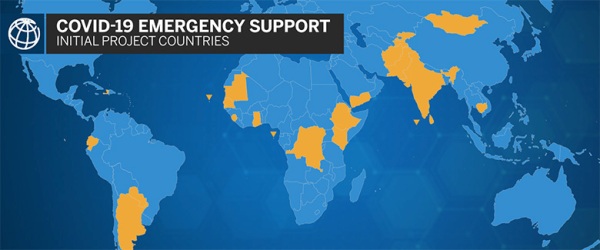
Kigali: The World Bank Group approved today $14.25 million IDA credit in immediate funding to support Rwanda’s response to the global COVID-19 (coronavirus) pandemic under a new operation – the Rwanda COVID -19 Emergency Response Project.
The project is designed to help the government prevent, detect and respond to the threat posed by COVID-19 and strengthen national systems for public health preparedness. It will support the COVID19 National Preparedness and Response Plan by financing critical interventions, such as prompt diagnosis of suspected COVID-19 cases; contact tracing to minimize risk of transmission; risk assessments to identify hot spot areas; and screening travelers at Ports of Entry. The emergency project will also bolster clinical care capacity and establish isolation capacity at a selected number of national and district hospitals responsible for triaging and treating COVID-19 cases.
“As we commemorate 26 years since the genocide and pay our respect to those who lost their lives, we note that the country is now hard hit by the COVID-19 global pandemic which runs the risk of reversing some of Rwanda’s hard won socio-economic and health achievements”, says Yasser El Gammal, World Bank Country Manager. “I am confident that with the high-level leadership, the resilience of the Rwandans swift action taken by the government, and support of the World Bank and other development partners, Rwanda can bend the curve on this pandemic and get back on track”.
The Rwanda COVID -19 Emergency Response Project also focuses on harnessing digital solutions and data analytical tools that will improve the management and containment of the COVID-19 response. Building on the country’s strong track record on digital solutions, several innovations will be explored, including digital maps that allow to visualize the spread of the disease in real time; mobile apps for sending health messages; and telemedicine capability to allow for suspected cases to be assessed without the need for physical movements by patients.
“Swift detection of COVID-19 and a rapid emergency response can save lives, reduce health care costs, and prevent the staggering socio-economic costs associated with disease outbreaks. As we have learned from past outbreaks, rapid containment, prompt and efficient diagnosis and treatment of patients; and community involvement are critical”, noted Miriam Schneidman, Lead Health Specialist and Task Team Leader at the World Bank.
The Rwanda COVID-19 Emergency Project is part of the World Bank Group $14 billion fast-track package to strengthen the COVID-19 response in developing countries and shorten the time to recovery. The immediate response includes financing, policy advice and technical assistance to help countries cope with the health and economic impacts of the pandemic.
The International Finance Corporation is providing $8 billion in financing to help private companies affected by the pandemic and preserve jobs. The International Bank for Reconstruction and Development and the International Development Association are making an initial $6 billion available for the health-response. As countries need broader support, the World Bank Group will deploy up to $160 billion over 15 months to protect the poor and vulnerable, support businesses, and bolster economic recovery.
* The World Bank’s International Development Association (IDA), established in 1960, helps the world’s poorest countries by providing grants and low to zero-interest loans for projects and programs that boost economic growth, reduce poverty, and improve poor people’s lives. IDA is one of the largest sources of assistance for the world’s 76 poorest countries, 39 of which are in Africa. Resources from IDA bring positive change to the 1.6 billion people who live in IDA countries. Since 1960, IDA has supported development work in 113 countries. Annual commitments have averaged about $21 billion over the last three years, with about 61 percent going to Africa. (End)
